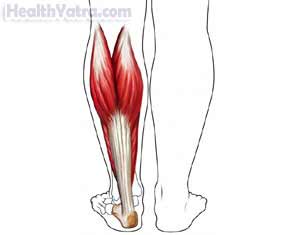Definition
Nocturnal leg cramps are sudden contractions of the lower leg and foot muscles. They often awaken you from sleep. The calf muscles are most often involved. The cramps are harmless. They do not mean that you have a serious disease.

Causes
The specific cause of nocturnal leg cramps is unknown. These cramps may be related to imbalances in local muscle chemistry. Many activities and diseases are associated with nocturnal leg cramps:
- Overexertion of the muscles
- Standing on hard surfaces
- Prolonged sitting
- Certain leg positions while inactive
- Dehydration
- Diseases:
- Diabetes
- Parkinson’s disease
- Hypoglycemia
- Hormone disorders (such as thyroid imbalance)
- Chemical imbalances (for example, calcium, potassium, magnesium)
- Certain medications:
- Blood pressure medicines
- Statins (that lower cholesterol)
- Morphine
- Lithium
Risk Factors
The following factors increase your chance of developing nocturnal leg cramps:
- Age over 50
- Overexertion
- Pregnancy
- Staying in certain positions for a long time
- Flat feet or other foot or ankle deformities
- Alcoholism
- Neurologic diseases
- Certain medicines
- Diabetes
- Parkinson’s disease
- Hypoglycemia
- Hormone disorders (such as thyroid imbalance)
- Chemical imbalances (for example, calcium, potassium, magnesium)
Symptoms
- Sudden nighttime calf (or foot) cramps
Diagnosis
Your doctor will ask about your symptoms and medical history. A physical exam will be done.
Tests may include the following:
- Blood tests
- Checking your foot pulses for good circulation
Treatment
Talk with your doctor about the best plan for you. If no specific cause can be found, treatment options include the following:
- When cramps occur, pull against them with your leg muscles. Also, grab your foot (feet) and pull up.
- Standing on the affected leg often stops the cramping.
- Massage and hot or cold treatments help the muscles relax.
Medications
None of these medicines has earned full approval for either safety or efficacy. Quinine, while often effective for reducing the frequency and intensity of cramps, has a significant risk of major allergic reactions. The other prescription medications carry risks as well. So, they are not generally recommended. They are most often used in only severe cases.
Over-the-Counter
- Diphenhydramine hydrochloride (Benadryl)
- Calcium
Prescription
- Quinine sulfate
- Simple muscle relaxants (for example, meprobamate, Equanil, Robaxin)
- Verapamil hydrochloride (Calan, Isoptin, Verelan)
- Chloroquine phosphate (Aralen)
- Hydroxychloroquine sulfate (Plaquenil)
- Carbamazepine (Tegretol)
- Phenytoin (Dilantin)
Prevention
To reduce your chance of getting nocturnal leg cramps, take the following steps:
- Stretch three times a day and just before going to bed.
- Face a wall, put your hands on the wall, and keep them there. Step backward. Keep your knees locked. Keep your heels on the floor until you feel a strong pull in your calves. Hold that position for 10 seconds. Repeat two or three times.
- Exercise feet and legs regularly.
- Drink plenty of liquids.
- Eat plenty of potassium-rich foods. These include bananas, tomatoes, potatoes, broccoli, cantaloupe, oranges, and grapefruit.
- Wear comfortable, supportive shoes.
- Sleep with toes up, not pointed downward.
